 Petzlover
Petzlover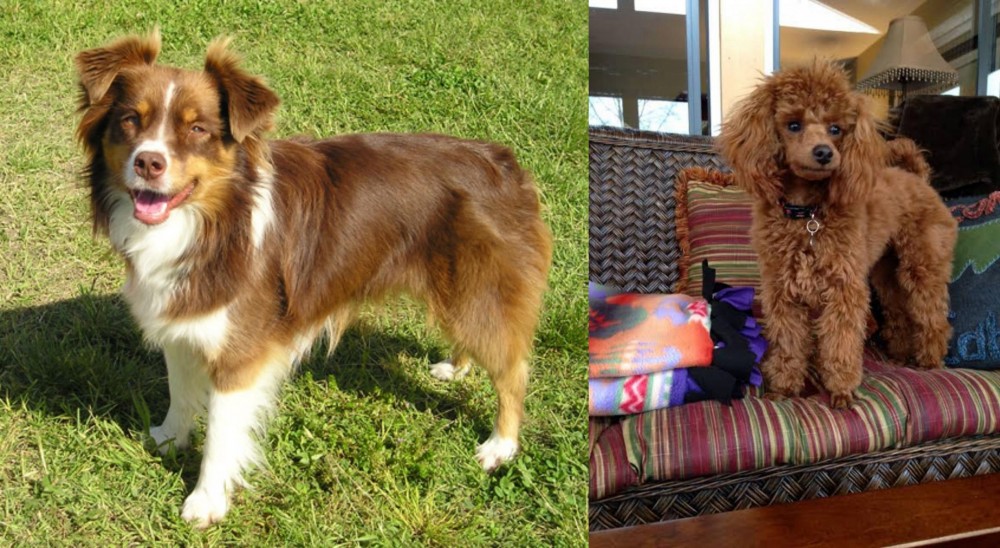 Miniature Australian Shepherd is originated from United States but Miniature Poodle is originated from Germany. Miniature Australian Shepherd may grow 8 cm / 4 inches higher than Miniature Poodle. Miniature Australian Shepherd may weigh 8 kg / 18 pounds more than Miniature Poodle. Miniature Australian Shepherd may live 3 years less than Miniature Poodle. Miniature Australian Shepherd may have more litter size than Miniature Poodle. Both Miniature Australian Shepherd and Miniature Poodle requires Moderate Maintenance.
Miniature Australian Shepherd is originated from United States but Miniature Poodle is originated from Germany. Miniature Australian Shepherd may grow 8 cm / 4 inches higher than Miniature Poodle. Miniature Australian Shepherd may weigh 8 kg / 18 pounds more than Miniature Poodle. Miniature Australian Shepherd may live 3 years less than Miniature Poodle. Miniature Australian Shepherd may have more litter size than Miniature Poodle. Both Miniature Australian Shepherd and Miniature Poodle requires Moderate Maintenance.
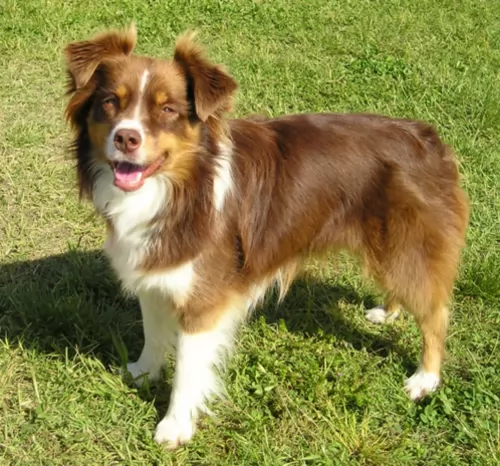 Unlike some miniaturized pure dog breeds, the Miniature Australian Shepherd is a breed of its own. The American Kennel Club and the United Kennel Club recognize that the miniature Australian Shepherd is the same as the miniature American Shepherd.
Unlike some miniaturized pure dog breeds, the Miniature Australian Shepherd is a breed of its own. The American Kennel Club and the United Kennel Club recognize that the miniature Australian Shepherd is the same as the miniature American Shepherd.
Certain breeding programs to develop the Miniature Australian Shepherd have been established and this dog is a small version of the Australian Shepherd. You can say that the Mini Australian Shepherd was developed in the 1960s and hails from the USA. American ranchers bred small Australian Shepherd dogs to create smaller replicas of the breed.
 The Poodle is no stranger to the dog world and has been a familiar face in Western Europe for hundreds of years. Though they have lived in Europe for centuries, their origins are unsure, with some saying they hail from Germany and others say France.
The Poodle is no stranger to the dog world and has been a familiar face in Western Europe for hundreds of years. Though they have lived in Europe for centuries, their origins are unsure, with some saying they hail from Germany and others say France.
The Miniature Poodles have been used in both countries as gundogs for water birds.
They have always been admired for their intelligence, and Miniature Poodles are believed to have been bred from Standard Poodles. It is interesting to note the 3 official sizes of the Poodle are Toy, Miniature and Standard – all considered one breed and judged according to the same written standard, just with different size requirements.
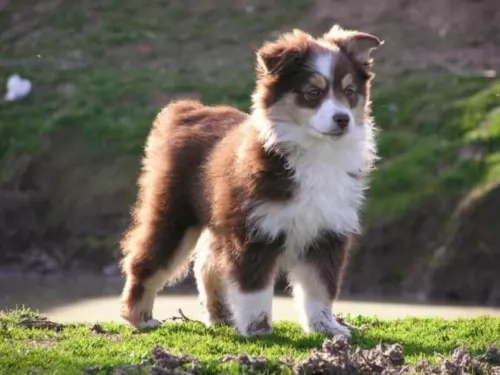 The Miniature Australian Shepherd’s coat is medium-length and is straight or wavy. It comes in a range of colors such as blue or red merle and red or black tricolor. There are white or tan markings as well. He is a small dog, standing at 33 - 46 cm in height and weighing 6 – 16kg.
The Miniature Australian Shepherd’s coat is medium-length and is straight or wavy. It comes in a range of colors such as blue or red merle and red or black tricolor. There are white or tan markings as well. He is a small dog, standing at 33 - 46 cm in height and weighing 6 – 16kg.
They have blue or brown eyes but some will even have one eye blue and the other brown. The ears are semi erect, semi floppy and the tail, while essentially left long and feathery, is sometimes docked.
Miniature Australian Shepherds are easygoing dogs who love being with their human families. They get on well with children in the home and are always willing to jump right in for a game.
They’re lively and agile and if its not games they’re busy with, they want to be on a walk. They’re loving and loyal and also eager to please, sensing what their owner wants.
They’re intelligent dogs too and easy to train so it is sure to go well with training and socialization, which is important for any dog. This training and socialization can actually help with problems a dog has such as being very nervous or being too active indoors. They become obedient and manageable wherever they are.
He is also willing to get on with other pets in the house. Just like the larger dog, the mini Australian Shepherd loves to be active and at work.
 With good care the lifespan of the Miniature Poodle is 14 – 16 years of age. This purebreed dog is small, standing at 28 – 38cm in height and weighing 7 – 8kg.
With good care the lifespan of the Miniature Poodle is 14 – 16 years of age. This purebreed dog is small, standing at 28 – 38cm in height and weighing 7 – 8kg.
The coat is typically curly, springy and dense. Colors of the coat can be cream, beige, silver, black, brown or apricot. They are low shedding dogs and are regarded as being hypoallergenic. The ears are floppy and the tail is usually docked to give the dog a nice, compact look.
The Miniature Poodle is intelligent and learns easily, so you won’t have any trouble with training him and having him socialized.
He is a lively dog and loves a game and a walk, loving as much time as possible spent with his human family. He gets on well with other pets in the home as well as with children who have been taught to be kind and gentle with animals.
They are not overly-friendly with strangers, and therefore make excellent watchdogs. They’re the kind of dogs who need both physical and mental stimulation though, and he won’t be content to be left and ignored – after all he counts himself as a member of your family! They make wonderful pets, being playful and energetic and loving water, always ready to swim with you.
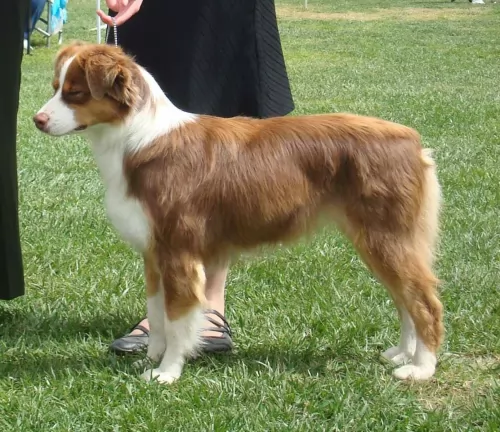 The wonderful friendly nature’s of these dogs make them excellent family pets, especially when they have been trained and socialized. They can live in the city or country but they will certainly require being exercised as they are an active breed, wanting to be busy with his human family.
The wonderful friendly nature’s of these dogs make them excellent family pets, especially when they have been trained and socialized. They can live in the city or country but they will certainly require being exercised as they are an active breed, wanting to be busy with his human family.
You can’t describe these dogs as low maintenance as they have long, thick hair that sheds and which will also need to be brushed regularly.
If you’re able to provide a good home for this beautiful, lively dog, then he will make you a splendid pet.
 When you take a Miniature Poodle into your home and your heart, there are many wonderful positive aspects that come with him.
When you take a Miniature Poodle into your home and your heart, there are many wonderful positive aspects that come with him.
You won’t have any trouble training him as he is clever and bright. He is such a loving, loyal pet and he takes his job of guarding you seriously too.
Because they aren’t aggressive, they're easy to keep in the city or the countryside, so long as he receives plenty of love, companionship and exercise. Perhaps the only thing that may require a little bit of effort on your part is the fact that his coat will require quite a bit of upkeep to keep it looking good and healthy.
In exchange for looking after him, you’re going to benefit from having a wonderful canine friend and family pet in your life for many years.
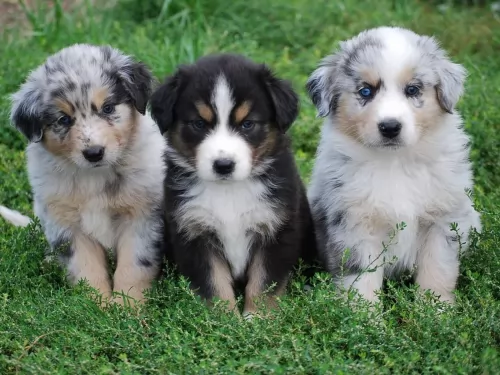 Your Miniature Australian Shepherd can enjoy good health if you make sure he has a nutritious diet, he is well exercised and he is happy and content because of the attention you give him. He can easily reach 13 years of age.
Your Miniature Australian Shepherd can enjoy good health if you make sure he has a nutritious diet, he is well exercised and he is happy and content because of the attention you give him. He can easily reach 13 years of age.
Also, say what you like, human beings constantly tampering with animals to produce certain looks has its drawbacks and can create health problems in dogs.
As a pure breed however, these dogs will be more susceptible to some common canine health problems such as hypothyroidism, patellar luxation, obesity, hip dysplasia, vision problems and cancer.
 Dog’s thrive on good nutrition and exercise, and if your Miniature Poodle gets both of these combined with plenty of love, he can live to be up to 16 years of age and even older.
Dog’s thrive on good nutrition and exercise, and if your Miniature Poodle gets both of these combined with plenty of love, he can live to be up to 16 years of age and even older.
They are robust little dogs, but even so, they can get sick. Ear infections, joint diseases, obesity, dental disease and bloat are common dog diseases to look out for -
This is a life-threatening condition where your pet’s stomach fills with gas. The swollen stomach puts pressure on the diaphragm and the dog battles to breathe. The dog could also vomit, be drooling and lethargic.
The stomach can also twist putting the dog in shock. This bloating can occur with any dog breed and efforts can be made to avoid it by feeding the dog smaller more frequent meals as opposed to one larger meal which he gobbles up.
The dog shouldn’t exercise immediately after a meal either. You also want to avoid obesity at all costs.
When the mitral valve malfunctions, blood isn’t being pumped out of the heart to the rest of the body. If the mitral valve weakens or leaks it can lead to endocarditis.
Quite a number of dogs develop some form of heart disease during their lifetime, with a high percentage being due to mitral valve insufficiency, which is more common in smaller dogs.
Your dog may have a cough, be lethargic and lose weight. The first signs of a leaking mitral valve is a heart murmur. At first MVI doesn’t have obvious clinical signs, but with time the efficiency of the heart is reduced and congestive heart failure develops. Your veterinarian will evaluate your pet and suggest treatment.
A skin problem sounds fairly mild but it can cause havoc in your pet’s life, causing him to be constantly licking and scratching himself. The hair becomes dull and brittle, and breaking the skin from continuous scratching invites bacterial infection. These skin infections will require veterinary intervention.
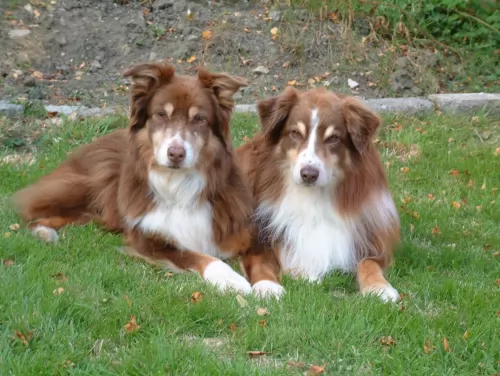 The mini Australian Shepherd has a long coat with seasonal shedding. You will need to give the coat a good brush twice a week to keep it untangled and to remove loose hair.
The mini Australian Shepherd has a long coat with seasonal shedding. You will need to give the coat a good brush twice a week to keep it untangled and to remove loose hair.
Other grooming for your pet will be to check his eyes and ears for infection, check for unusual lumps when you brush him and check for fleas and ticks. Keep his nails trimmed and brush his teeth 2 or 3 times a week to avoid plaque build up.
If you’re wondering how to keep your dog well groomed for the enhancement of this health, people such as your vet or professional groomers will do these grooming tasks for you.
Top quality commercially manufactured dog food packed with vitamins and minerals needs to be your choice if you're going to be using these dog foods. Avoid the cheaper brands that use lots of fillers, sugar, salt, colorants and preservatives.
Home-made food is a wonderful treat for a dog and delicious, nutritious and simple ingredients such as boiled chicken, brown rice or pasta and some cooked vegetables chopped up into his dry kibble from time to time will do him wonders.
Sometimes it will also be good to add in a little bit of raw meat too. Make sure there is a bowl of fresh, cool water available to your pet constantly.
 If you opt to keep your Miniature Poodle’s coat long, it will actually require regular brushing – every day in fact, if you want to avoid matting and tangling. Most people don’t like the work this involves and they have their Poodle’s hair cut short all over, then he only needs a brush once or twice a week. Your Miniature Poodle just loves the time you spend with him grooming him. It’s your time to feel for any unusual lumps and to also check for fleas and ticks. Some people take their pet to the doggy parlor to have the coat clipped.
If you opt to keep your Miniature Poodle’s coat long, it will actually require regular brushing – every day in fact, if you want to avoid matting and tangling. Most people don’t like the work this involves and they have their Poodle’s hair cut short all over, then he only needs a brush once or twice a week. Your Miniature Poodle just loves the time you spend with him grooming him. It’s your time to feel for any unusual lumps and to also check for fleas and ticks. Some people take their pet to the doggy parlor to have the coat clipped.
The dog’s nails should also be trimmed regularly, and their ears also need to be checked for wax buildup and debris which can lead to an ear infection.
Teeth need to be checked over too because dental disease won’t only lead to loss of teeth but it could be toxic for important body organs too.
Wipe around your pet’s eyes as tear stains can form under the eyes.
Make sure to feed your pet a top quality diet full of vitamins and minerals. Get to know the foods which can be toxic for your pet and cause stomach upsets. Dogs appreciate simplicity and consistency with their diets, and apart from dry kibble, home-made food such as boiled chicken, brown rice and vegetables can be excellent for your pet.